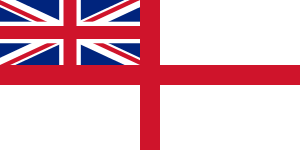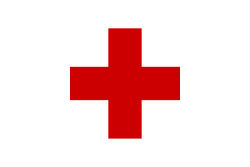Queen Alexandra's Royal Naval Nursing Service
| Royal Naval Nursing Service | |
|---|---|
| Active | 1884 - Present |
| Country | United Kingdom |
| Allegiance | HM The Queen |
| Branch | Royal Navy |
| Type | Nursing |
| Role | Medicine |
| Website | Queen Alexandra's Royal Naval Nursing Service |
| Commanders | |
| Matron-In-Chief | Captain Inga Kennady |
| Patron | HRH Princess Alexandra, The Honourable Lady Ogilvy, LG, GCVO |
| Insignia | |
| White Ensign (1801 – present) |
 |
| Naval Jack |
 |
| Red Cross Emblem |
 |
 |
| Her Majesty's Naval Service of the British Armed Forces |
|---|
| Components |
|
|
| History and future |
|
|
| Ships |
| Personnel |
| Auxiliary services |
Queen Alexandra's Royal Naval Nursing Service (QARNNS) is the nursing branch of the British Royal Navy. The Service unit works alongside the Royal Navy Medical Branch.
As of 1 January 2006, according to former Ministry of Defence junior minister Don Touhig, the QARNNS had a total strength of 90 Nursing Officers and 200 Naval Nurses (ratings) out of a requirement of 330.[1]
The Navy List (2006) listed 92 QARNNS Officers, of whom 2 were Captains (including 1 DNNS/Matron-in-Chief), 7 Commanders, 19 Lieutenant-Commanders, 60 Lieutenants and 4 Sub-Lieutenants. The Navy List (1981) listed 146 QARNNS Officers, of whom one held the rank of Matron-in-Chief, 2 were Principal Matrons, 4 Matrons, 32 Superintending Sisters, 89 Senior Nursing Sisters and 13 Nursing Sisters; five of the 145 QARNNS Officers were non-nursing officers: 2 Senior Clerical and Quarters Officers and 3 Clerical and Quarters Officers.
History
In 1883, a committee determined that improvements were needed in medical and nursing care in the Royal Navy. As such, in 1884, a uniformed Naval Nursing Service was introduced, staffed by trained nurses. These nurses served on shore, initially at Haslar and Plymouth.[2]
In 1902, Alexandra of Denmark, the queen consort of Edward VII of the United Kingdom, became President of the Nursing Staff; in her honour, the Naval Nursing service was renamed Queen Alexandra's Royal Naval Nursing Service.[2]
Queen Alexandra's Royal Naval Nursing Service Reserve was established on 13 October 1910.[3]
In 1914, with the outbreak of the First World War, QARNNS was significantly expanded, with many volunteers from the British Red Cross and civilian hospitals; similarly, during the Second World War, many volunteer QARNNS nurses were deployed overseas.
In 1949 a nursing branch of the Women's Royal Naval Service was formed; however, in 1960 these nurses were integrated into QARNNS, creating a single nursing service. In 1982 an integrated service was formed, allowing men to serve as nurses in QARNNS.[2] The first man to join was Senior Nursing Officer Rajendrasen Purusrum, who was commissioned on 1 March 1983.
Although fully affiliated to the Royal Navy from 1977, QARNNS was technically a separate service until 31 March 2000, when it officially became part of the Royal Navy.
Queen Alexandra was President until her death in 1925. The following year she was succeeded by Queen Mary. Princess Alexandra became Patron in 1955.
Ranks
Initially there were only two ranks: Nursing Sister and Head Sister. In 1911 the intermediate rank of Superintending Sister was introduced.[4] There was no overall head of the service until the introduction of the rank of Head Sister-in-Chief on 1 August 1927. By 1937 Head Sister and Head Sister-in-Chief had been renamed Matron and Matron-in-Chief.
The ranking system changed during the Second World War.
| QARNNS rank | Equivalent RN rank |
| Nursing Sister | Lieutenant |
| Senior Nursing Sister | Lieutenant |
| Superintending Sister | Lieutenant-Commander |
| Matron | Lieutenant-Commander/Commander[5] |
| Principal Matron | Commander/Captain[6] |
| Matron-in-Chief | Commodore |
Ratings, known as Naval Nurses, were introduced in 1960, with the integration of the WRNS nurses. Their ranking system was similar to that of Royal Navy ratings.
In 1982, in preparation for the introduction of male officers, the Nursing Officers' ranking system was changed.
| QARNNS rank | Equivalent RN rank |
| Nursing Officer | Sub-Lieutenant |
| Senior Nursing Officer | Lieutenant |
| Superintending Nursing Officer | Lieutenant-Commander |
| Chief Nursing Officer | Commander |
| Principal Nursing Officer | Captain |
| Matron-in-Chief | Commodore |
In 1995 the QARNNS adopted Royal Navy ranks, although the head of the Nursing Service was no longer a one-star equivalent, the senior Captain of the QARNNS was appointed Director Naval Nursing Service (DNNS) and styled with the historic post of Matron-in-Chief.
List of Head Sisters-in-Chief/Matrons-in-Chief/Directors of Naval Nursing Services QARNNS
- Margaret Keenan, 1927–1929
- Mildred Hughes, 1929–1934
- Catherine Renwick, 1934–1937
- B. M. Martin, 1937–1940
- Annabella Ralph, 1940–1941
- Dame Doris Beale, 1941–1944
- Matilda Goodrich, 1944–1947
- Olga Franklin, 1947–1950
- Jeannie Gillanders, 1950–1953
- Kathleen Chapman, 1953–1956
- Barbara Nockolds, 1956–1959
- Helen Moore, 1959–1962
- Joan Woodgate, 1962–1966
- Mary Fetherston-Dilke, 1966–1970
- Christina Thompson, 1970–1973
- Cynthia Cooke, 1973–1976[7]
- Patricia Gould, 1976–1980
- Margaret Collins, 1980–1983
- Jean Robertson, 1983–1986
- Eileen Northway, 1986–1990
- Jane Titley, 1990–1994
- Captain Claire Taylor, 1994–1996[8]
- Captain Patricia Hambling, 1996–c.2000
- Captain Michael Bowen, 2000– 2003 (dates need confirmation)
- Captain Lynne Gibbon, 2003–2008
- Captain Helen Allkins, 2008–2011[9]
- Captain Inga Kennedy, 2011–
See also
- Queen Alexandra's Royal Army Nursing Corps
- Princess Mary's Royal Air Force Nursing Service
- Royal Navy Medical Branch
References
- ↑ Hansard, 16 March 2006
- ↑ 2.0 2.1 2.2 Queen Alexandra's Royal Naval Nursing Service at the Royal Navy website
- ↑ "Queen Alexandra's Royal Naval Nursing Service Reserve", The Times, 4 January 1911
- ↑ "The Medical Service of the Navy", The Times, 28 June 1911
- ↑ Lieutenant-Commander until 1976, Commander thereafter.
- ↑ Commander until 1976, Captain thereafter.
- ↑ Sea Your History website: QARNNS: Matron-in-Chief Cynthia Cooke
- ↑ Sea Your History website: QARNNS: Matron-in-Chief Claire Taylor
- ↑ QARNNS: current Matron-on-Chief website